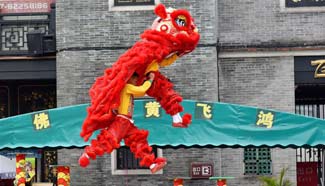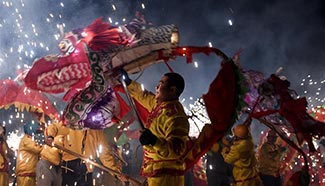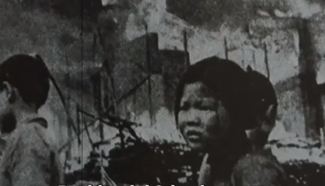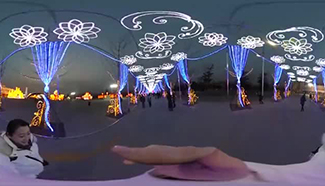ZHENGZHOU, Feb. 10 (Xinhua) -- Each year after Spring Festival, Majie village in central China's Henan Province is visited by folk artists from across the country.
The folk art fair there has lasted for 700 years. The event is said to originate from a prestigious folk artist in the village, whose many disciples gathered to celebrate his birthday in 1316.
The birthday celebration later evolved into a folk art fair. This year's event, from Tuesday to Thursday, in a wheat field in Majie, attracted 1,200 artists and 300,000 visitors.
Chinese folk art, or Quyi, has many forms, including ballad singing, story telling and cross talk, etc.
The Quyi fair presents an opportunity for the audience to establish contact with their favorite artists and pay them to perform.
At the height of Quyi, Zheng Jinpin, an artist at this year's fair, could earn 200 yuan (about 30 dollars) for a day's performance. But in recent years, spectators are less interested and the love of Quyi has waned.
Despite this the annual Quyi fair remains a calling for artists.
"It doesn't matter whether or not I am invited to perform at the event," said Zheng, 68, who has attended every year since he was 16. "I have to come to meet with my colleagues."
Like Zheng, Li Dongmei, 61, has attended almost every fair since she started performing in her teens.
She was the "Quyi fair champion" last year, an award for the best performing artist during the fair. This year, she turned down a week-long performance in order to attend the fair instead.
"Here is a home for us artists," Li said. "We are busy with our own lives all year around, and this is a time for us to gather."
VILLAGE HOST
Majie village has about 5,000 residents, but it hosts more than a thousand folk artists every year. Many villagers volunteer to provide free food and lodgings for artists during the fair.
Zhang Mantang, 64, has housed about 150 artists this year. Zhang, a businessman, returned to Majie in 2004 when the fair was losing popularity.
In 2006 he built 12 rooms, and bought bunk beds and cushions to host the guests. Over the years, Zhang has spent hundreds of thousands of yuan protecting the arts.
In 2006, the Majie Quyi Fair was inscribed on the first national intangible cultural heritage list. Zhang received government subsidies for his efforts in recent years.
As the fair ended and night fell, many guests gathered in Zhang's yard to talk about their lives and arts.
"The artists are the soul of Quyi," Zhang said. "I have to keep them together."














